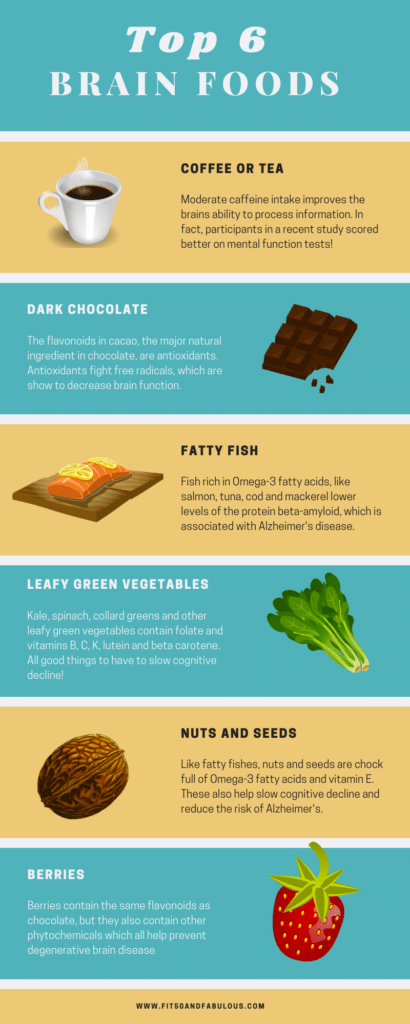Most of us put some effort into keeping our maturing bodies physically healthy. But how much effort do we put into keeping our brain healthy?
The World Health Organization estimates the annual number of new cases of dementia worldwide is 10 million. There are presently about 50 million people living with dementia. This number is expected to double by 2030.
I bet many of you are familiar with the all-too-common statement, ‘What did I come into this room for?’ Perhaps you have described an aging friend or relative as being ‘sharp as a tack’?
If you have ever uttered these comments, then you understand the importance of having a healthy brain. Today, I will talk about brainpower and what you can eat to help keep your brain healthy. This is going to be yummy!
Brain Basics

Our brain burns approximately 20% of our daily calories. It also needs specific nutrients to build brain cells. Healthy brain cells are linked to a decreased risk of age-related disorders like Alzheimer’s disease, inflammatory diseases, and stress.
The National Institute of Neurological Disorders calls the brain ‘the crown jewel of the human body.’
This three-pound ‘jewel’ happens to be the most complex organ in our body. It gives us our intelligence, helps us to interpret our senses and behaviors, and controls each movement we make.
Think about all of that. Without your healthy brain, you may not be able to!
Top 6 Food for a Healthy Brain
Eating foods that improve your brain health can have many short- and long-term positive cognitive function effects.
When you are in your golden years, would you like people to refer to you as ‘sharp as a tack’? Adding these top six brain foods to your daily diet have scientific evidence backing up claims that they work.
Coffee and Tea
Many of us cannot imagine starting our day without a fresh hot cup of coffee or tea. Some even say that they ‘don’t feel human’ until that first cup of the day. I’m also betting there’s at least one person (maybe even yourself!) that you just don’t talk to until they’ve been caffeinated.
Why does caffeine give us that ‘oomph’? Caffeine blocks the production of a brain chemical called adenosine. This brain chemical makes us feel tired. Studies have found that moderate caffeine intake (less than 200 mg. per day) improves the brain’s ability to process information. But remember, too much of something is never good.
Would you like to find out how much caffeine your favorite beverage contains? Have a look at the Caffeine Informer. It lists the caffeine content of many drinks. Spoiler alert: tea does not contain more caffeine than coffee.
Dark Chocolate
I am a chocolate lover. Okay, who am I kidding? I’m a chocoholic. Milk chocolate, dark chocolate, any kind of chocolate! But do you know why more people are eating dark chocolate? Let me explain.
Dark chocolate contains an abundance of cacao. Cacao contains flavonoids. Flavonoids are antioxidants. Antioxidants are molecules that fight free radicals in your body. Whoa! Is this too much information? Grab a piece of dark chocolate, and I will tell you what all this has to do with brain health.
Our body creates some of its own antioxidants, but we can also find them in foods we eat, such as dark chocolate. Our body builds up free radicals as a result of chemical reactions in our cells like metabolism.
When our levels of free radicals become too high, they can contribute to many diseases, which often decreases brain function. Researchers found that cacao’s antioxidants may improve brain plasticity. Our ability to learn and remember relies on our brain’s plasticity.
The next time you are in the candy aisle at the grocery store, look at the dark chocolate bar’s front wrapper. You will likely notice a bold mention of the percentage of cacao in the bar. A percentage of 70% or higher is best for your brain.
Fatty Fish
Fatty fish sounds like an oxy-moron. Have you ever see a fat fish? Beside, if fish is supposed to be healthy, why on earth would we seek out ‘fatty fish’?
When we’re talking about fatty fish, we’re not talking about fat at all. We’re actually talking about the fatty acids that are present in some fish, specifically, omega-3 fatty acids.
These omega-3 fatty acids have a multitude of brain health benefits. They are associated with lowering blood levels of the protein beta-amyloid. Research suggests that high levels of beta-amyloid form damaging clumps in the brain, which are associated with Alzheimer’s disease. Additionally, a diet rich in omega-3 fatty acids increases blood flow to the brain, which improves thinking ability, It’s also been shown to decrease the risk of dementia, slow mental decline, and memory loss.
Now, about those fatty fish. Fatty fish refers to fish such as salmon, cod, mackerel, sardines, tuna, and herring. These are excellent sources of omega-3 fatty acids. Two servings of fish a week is recommended.
If you don’t enjoy fish, consider taking an omega-3 supplement. If you’re avoiding taking an omega-3 supplement because of the fishy aftertaste, look for enteric-coated brands. This coating helps avoid any ‘fishy’ aftertaste. Remember, only take supplements if you are deficient in it. But even if you do take a fish oil supplement, fish consumption is still highly encouraged as the omega-3s in
fish are more reliable and easier absorbed.
If you would like more information on Omega-3 fatty acid supplementation, please read my article on the best supplements for women over 50.
Leafy Green Vegetables
Here is one more reason why we should eat our veggies. Leafy, green vegetables help slow cognitive decline.
Leafy green vegetables are full of nutrients. Folate, vitamins B, C, K, lutein, and beta carotene are just a few of those nutrients. Many veggies also contain flavonoids. Those are the same free-radical busting antioxidant molecules present in chocolate that improve brain plasticity. Wait – does that mean that chocolate is as healthy as leafy greens??!! Hmmm….
Next time you’re at the grocery store, pick up some brussels sprouts, broccoli, kale, spinach, collards, and bok choy. These are the rock stars vegetables that studies conducted by the Jean Mayer USDA Human Nutrition Research Center on Aging (HNRCA) at Tufts University were shown to impact cognitive functioning.
This study showed that those who regularly ate 1.5 servings of leafy green vegetables per day had the cognitive functioning elven years younger than those who did not.
So, toss some broccoli in your scrambled eggs (or better yet – egg whites!), Mix up a nice deep green spinach salad. Try a healthy veggie wrap. Hide some kale in your smoothie and nourish your brain.
Nuts and Seeds
Nuts and seeds are full of omega-3 fatty acids and the antioxidant vitamin E.
Studies show that Vitamin E can prevent or delay cognitive decline in the aging population. Further evidence indicates that it can also reduce the risk of Alzheimer’s disease.
Sunflower seeds, almonds, and hazelnuts have the highest amounts of Vitamin E.
A 2015 study from UCLA linked higher walnut consumption to improved memory and cognitive test scores. Walnuts are high in a type of omega-3 fatty acid called alpha-linolenic acid (ALA), which helps lower blood pressure and protects arteries. Healthy blood flow benefits both the heart and brain.
Try topping your green leafy salad with some walnut pieces!
Berries
I love strolling down the produce aisle and seeing the rich, vibrant colors in the berry section. Berries are also one of the few fruits left that I haven’t developed an allergy to.
Did you know that flavonoid antioxidant gives berries some of their gorgeous colors?
Clinical research shows that berries can prevent degenerative brain disease and improve cognitive function. These protective effects are related to phytochemicals such as anthocyanin, caffeic acid, catechin, quercetin, kaempferol, and tannin. Berries contain all of these.
Strawberries, black currants, blueberries, blackberries, and mulberries are excellent sources of flavonoids and phytochemicals. They also taste great in a bowl of cereal or yogurt!

Hydrate Your Brain
Our brain is about 75% water. So, we need to keep our brain hydrated. A well-hydrated brain is a well-functioning brain.
Many people hate to think about drinking 6-7 glasses of water each day. If you are one of these people, do not set such a strict goal for yourself.
Try taking sips of water throughout the day. Try drinking half a glass of water each time you eat something. Before you know it, your body will crave water.
Here are a few things that water does for your brain:
- Water makes your brain work faster.
Almost all college students know that drinking water will help them study. I’ve also found that when I’m stuck in an all day meeting, drinking water helps keep me awake and alert.
Did you know that the most critical time of day to hydrate is when you first wake up? After all, you’ve been sleeping for 7-9 hours. Do you sometimes wake up with a stuffy nose? This is because every breath you take depletes your body’s moisture. So when you wake up, you are already a little dehydrated.
Go for the combo. Have a glass of water and a handful of berries with your morning coffee. You will be off to a good start.
- Water improves your memory and focus.
Most people don’t notice that they are dehydrated until they get symptoms like dizziness. But did you know that we begin to hydrate after going only 45 minutes without fluids?
All you need is a sip or two of water regularly. This can help prevent your brain’s function from declining.
- Water helps to balance your mood.
Water might be boring, but it helps to balance your brain chemistry and remove toxins, and in fact, can act as a bit of a brain ‘restart.’ Who doesn’t need that on a Monday morning?!
Try keeping a couple of bottles of water in the cup holders of your car. Take sips of water throughout the day, every day. Your brain will thank you for functioning better.
Final Thoughts
Our brain is a beautiful gift. When it isn’t healthy, we suffer.
We may not have total control over how our brains will function as we age. But we can do something as simple as nourishing it with the right foods.
We eat anyway. So, why not eat these six brain foods? There is so much compelling evidence to prove that doing so will help keep you smart as a tack.
So, the next time you find yourself standing in the middle of a room and wondering why you are there, do this. Head for the kitchen and drink some water. While you are drinking your water, start planning your next meal full of brain food!

